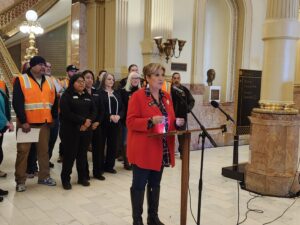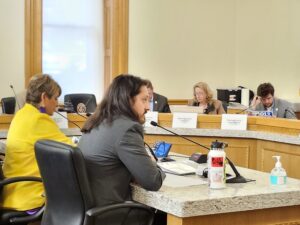Gov. Jared Polis late Friday vetoed two of the major labor-backed bills of the 2024 legislative session — one to create new liability for general contractors in wage-theft cases and the other to bar mandatory meetings at which politics or religion could be discussed.
The Democratic governor’s rejection of the wage-theft measure came after a campaign by more than a dozen business and contracting groups trying to get him to understand why House Bill 1008 was not, in their opinion, the right way to combat the problem. And Polis’ veto letter reflected much of that industry sentiment, saying the creation of new liability for general contractors who may not have had any idea that such illegalities were occurring was an overly punitive response that would do little to solve the problem.
Similarly, Polis’ veto of HB 1260, the “Worker Freedom Act,” criticized sponsors for taking a far-too-broad approach to a very focused problem — workers being forced to sit in captive-audience meetings critical of labor groups during a unionization process. Rather than outlawing those instances, HB 1260 would have put employers into an “impossible position” of trying to determine when mention of politics or religion is necessary to a job and could be dinged even for promoting staff volunteerism, he wrote.
Polis backs arguments of business leaders
Business leaders who had opposed the two bills thanked Polis for hearing their concerns and for his decisions, which came just nine days after the conclusion of the 2024 session and less than two weeks after both bills passed. And much of that praise was directed at his choice on HB 1008, which they had fought not on concept but on execution, saying that wage theft is a terrible crime but one that can be attacked in ways that are more effective and fairer to contractors.
“We appreciate that he agreed that holding one company responsible for the wrongdoing of another company was not the right way to go and was a disruption to the marketplace,” said Michael Gifford, advocacy director for Associated General Contractors of Colorado. “We certainly think wage theft is wrong. But we were excited about this policy not going forward because it was going to raise the cost of housing for people who want affordable housing and not unaffordable housing.”

Colorado House Majority Leader Monica Duran discusses her coming wage-theft bill in January at the Capitol.
HB 1008, sponsored by Democratic House Majority Leader Monica Duran of Wheat Ridge and Democratic Rep. Meg Froelich of Greenwood Village, was the latest in a years-long series of efforts to stop the ongoing problem of wage theft. Such theft can occur when contractors refuse to pay wages earned by workers — or disappear when those workers show up to collect checks, as detailed in committee hearings this session — but also when workers don’t get overtime pay or needed breaks.
The bill attempted to take a new approach to the issue by allowing workers stiffed by subcontractors to go straight to contractors and demand payment within three days.
Who is responsible for unpaid labor bills?
Labor advocates said this would require general contractors to ensure their subs are not ethically questionable. But industry leaders said it would bypass several layers of subcontractors and likely mean general contractors would start requiring bonds from subs that would drive up project costs and make it hard for smaller firms to compete for jobs.
Polis’ veto letter reflected that thinking, saying the enforcement mechanism would penalize general contractors “even when not at fault under any reasonable standard” and would single out a lone sector for the “unique and novel joint liability mechanism.” The governor wrote that he suggested multiple changes to improve the bill, including penalties for general contractors proven to be responsible for theft and ways to adjudicate claims more quickly, but that proponents would not consider more targeted solutions.
“This bill, however, would let subcontractors who fail to pay their workers off the hook, do little if anything to prevent additional wage theft and penalize good actors who pay all their workers on time,” the governor wrote.

A large crowd fills House Committee Room 112 to hear a bill on construction wage theft in February.
Labor advocates push back
Towards Justice, a worker-advocacy law firm that supported HB 1008, said in a statement posted on website X, formerly Twitter, on Friday night that it was “deeply disappointed” in Polis’ decision. A law creating joint and severable liability — some version of which has been adopted by 10 other states — stops large contractors from turning a blind eye to a practice that witnesses described as far too pervasive, it said.
“At Toward Justice, we see hundreds of workers each year who are unable to recover their legally earned wages because they are employed by a shady middle man,” the statement said. “The policy of holding that middle man liable to both the general contractor and to workers for unpaid wages would have helped Colorado’s construction workers get paid while ensuring that those who profit off wage theft are accountable for it.”
The bill could have affected not only the construction industry that it targeted but also the already rising cost of doing business in Colorado, which CNBC recently ranked 38th in the country, Colorado Chamber of Commerce President/CEO Loren Furman noted in her veto-request letter. She too said she was pleased with Polis’ decision.
Worker Freedom Act
HB 1260 sought to bar the practice of employers forcing workers to sit in meetings designed to portray only the down sides of unionization — known as captive-audience meetings — and then punish them if they refused to participate. But the bill from Duran and Democratic Rep. Tim Hernandez of Denver went much further, saying that employers could face state punishment for disciplining workers who refuse to attend employer-sponsored meetings concerning religious or political matters.

Colorado state Rep. Tim Hernandez, seated next to House Majority Leader Monica Duran, explains the Worker Freedom Act to a committee in March.
Witnesses testifying at the bill’s first hearing on March 20 said the broad language of the bill could mean that municipal employees could boycott meetings having to do with City Council hearings or that workers could skip meetings explaining how new laws affect them. Sponsors added exemptions for some religious-based and higher-education organizations and removed from the bill a proposed private right of action, but the changes weren’t enough for Polis.
The governor noted in his veto letter that employers would have to interpret the bill’s exemption to discuss with workers such matters that are “necessary to their job duties” and said that was too tough. Some workers could consider meetings to shine light on volunteer activities as political or religious, particularly as the bill’s definition of “political matters” included a decision to join or support nonprofit organizations established for community welfare purposes, he noted.
As with his veto of HB 1008, Polis took sponsors and supporters of the bill to task for rejecting his consistent pleas to narrow the scope of the bill. He went so far as to say in the letter that he would have signed legislation barring employees from being forced to attend a meeting that focuses on the negative aspects of union participation. But he did not get that bill.
Discussion not over on wage theft
“The bill’s definitions of ‘political matters’ and ‘religious matters’ are so broad that they are unworkable and would result in unintended consequences for employers and employees alike,” Polis wrote in the veto letter. “While the bill does include certain limited exceptions, I am concerned that even the exceptions will cause confusion and are insufficient in addressing employers’ day-to-day operational needs. Moreover, the breadth of the definitions could chill free speech.”
The governor did, in his HB 1008 veto letter, direct the Colorado Department of Labor & Employment to work with stakeholders on all sides to further explore legislative and budgetary proposals to reduce wage theft. He particularly exhorted it to look at how victims of subcontractor wage theft could receive prompt and fair restitution and how the state could disincentivize the crime and provide recommendations within 60 days.

Michael Gifford, advocacy manager for Associated General Contractors of Colorado, explains his objections to a wage-theft bill at a January council meeting at the Colorado Chamber of Commerce.
Gifford said that is a conversation that contractors are eager to have, as they believe the current framework within CDLE is effective and can be even more so if it were strengthened in some ways. He hopes the department will look at growing the 30 investigators who now probe wage theft and allowing for payout in less than six months from an already established fund to restore workers whose wage-theft perpetrators have disappeared.
“We’re excited about the governor’s veto letter because it doesn’t just say ‘This is bad,’ but it gives a roadmap for what is next,” Gifford added.
